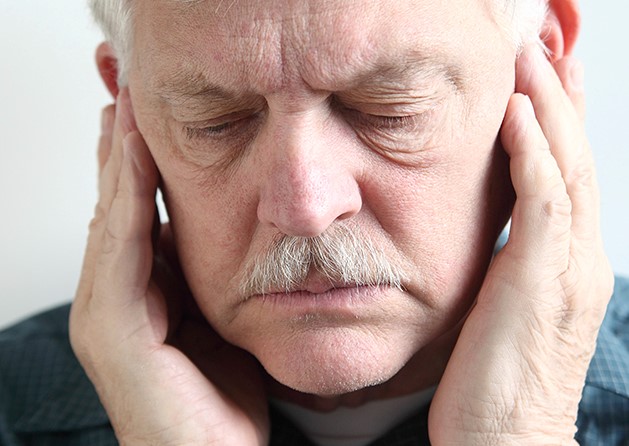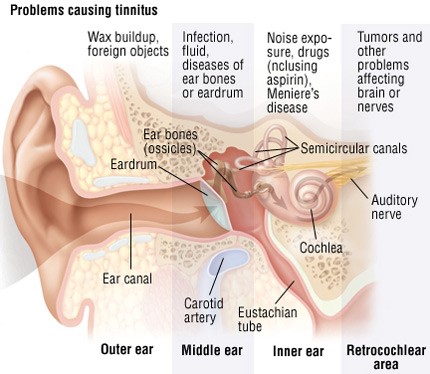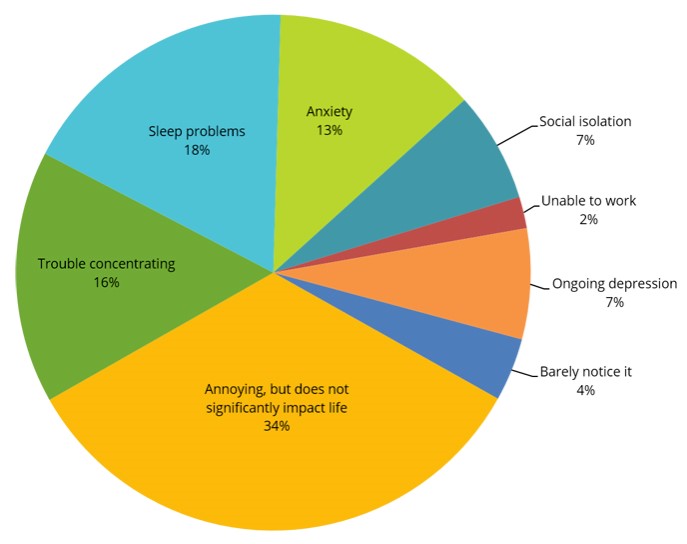Years before they reach retirement age, senior citizens often begin thinking about the “golden years.” And, while they ponder heart disease, hypertension, arthritis and problems with their eyes, one particular disease often escapes their attention: tinnitus.
Tinnitus comes from the Latin word meaning “to ring or tinkle.” It’s a collection of symptoms of the inner ear, that’s often referred to as “ringing in the ears.” While ringing is the most frequently described sound, it can also appear in the form of swooshing, clicking, buzzing or hissing. Some people refer to the sound as music.

According to the Center for Disease Control , tinnitus affects more than 50 million people a year. For most, it’s usually an inconvenient, benign problem. But the physical impact of the disease can cost sufferers more than $30,000 a year in lost wages and health expenses. It costs American society more than $26 billion, annually. According to studies conducted by the United States Veterans Administration, over 970,000 veterans (one of the highest risk groups for contracting tinnitus) received treatment during 2012, at a cost of more than $1.5 billion.
As a general rule, tinnitus affects more men than women, is more prevalent in older populations, and appears more frequently in white Americans. High risk groups include:
- People with behavior issues
- People who work in loud workplace environments
- Motorsports and hunting enthusiasts
- Musicians and music lovers
- Senior citizens
- Active military personnel
There are two common types of tinnitus: subjective and objective. In subjective tinnitus , sounds are heard only by the patient. These represent more than 99% of tinnitus cases. Objective tinnitus sufferers hear noises that are audible to other people, as well as themselves, and usually represent sounds like the hissing of blood flow and the movement of muscles.
In nearly every case, tinnitus sufferers complain of subjective sounds – sounds only they can hear. They complain of:
- Tonal Tinnitus – hearing continuous sounds of specific frequencies
- Pulsatile Tinnitus – hearing sounds that align themselves with the body, like heart beats
- Musical Tinnitus (also known as Musical Ear Syndrome ) – hearing music or singing in a continuous loop.
The American Tinnitus Association has compiled a number of sample tinnitus sounds that may help your healthcare provider diagnose your type of tinnitus. Click on the description below to hear each of the sounds. Remember to turn your volume up:
| 4000 Hz tone |
| 7500 Hz tone |
| Tea kettle tone |
| Buzzing or cicada tone |
| Static tone |
| Screeching tone |
| Electric tone |
| Roaring tone |
When most people are presented with a diagnosis of tinnitus, they immediately ask, “How did I get it?” or “What did I do wrong?”
Tinnitus is not a disease in and of itself. Rather, it represents a series of symptoms representative of nearly 200 underlying health conditions. The most frequent cause is hearing loss.

Hearing Loss and Tinnitus
There are two common types of hearing loss that are associated with tinnitus: age-related hearing loss (often called presbycusis ) and noise-induced hearing loss .
Although tinnitus can afflict anyone, at any age, the most common cause of hearing loss is the aging process, usually beginning around age 60. In addition to the aging process, many people have spent their lives engulfed in high-decibel noise – loud machinery, music, sporting events and concerts. Other causes of hearing loss include ear wax accumulation (ceruminosis), dirt or foreign objects in the ear canal, loose hair in the ear canal and head congestion. It can also be caused by:
- Sinus pressure and barometric trauma
- Head and neck trauma
- Traumatic brain injury (TBI)
- Temporomandibular joint disorder (TMJ)
Ototoxic drugs, including non-steroidal anti-inflammatants, antibiotics, water pills & diuretics, quinine medications, and certain types of cancer treatment medications.
Related diseases and medical conditions such as depression, anxiety, stress, hypertension, atherosclerosis, Ménière’s disease, thoracic outlet syndrome, otosclerosis, Lyme disease, fibromyalgia, acoustic neuroma, and vestibular schwannoma.
Hearing loss is the most commonly associated complaint underlying tinnitus. Rarely does it occur in people without compromised hearing. Other commonly associated diseases include:
Depression and anxiety – as many as 78% of tinnitus patients experience depression and anxiety. People with general anxiety disorder are 7 times more likely to experience tinnitus that becomes a burden on the quality of their life.
Ménière’s Disease – in addition to hearing loss, Ménière’s Disease (also called endolymphatic hydrops) sufferers experience vertigo.
Misophonia – also called selective sound sensitivity , Misophonia results in negative emotional reactions to certain types of noises. They experience disgust, fear or anger to certain sounds and visual stimuli.
Phonophobia – phonophobic people experience strong, fearful reactions to loud sounds or noises.
Vestibular conditions – vestibular conditions are complications with the vestibular system – the system in the inner ear that controls spacial orientation and balance.
Testing for Tinnitus
If your healthcare provider or audiologist suspects you have tinnitus, they may suggest a number of tests to confirm their diagnosis. Common tests include:
- Speech recognition tests
- Pure tone audiogram
- Tympanogram
- Acoustic reflex testing
- Optoacoustic emission testing
- Loudness discomfort level testing
- Minimum masking levels
- Tinnitus sound matching
Administering tests may also include a series of mental examinations to estimate how much the patient’s tinnitus is likely to impact their quality of life.
Unlike cancer or heart disease that may significantly impact loved ones or co-workers, tinnitus patients are usually relegated to suffer with their disease in silence. Millions manage some way of living with tinnitus. However, more than two million suffer with extreme or debilitating symptoms that include:
- Poor concentration
- Sleep disturbances
- Depression
- Anxiety
- Feelings of distress
- Frequent mood swings
- Irritability and frustration
In 2014, the American Tinnitus Association surveyed 1100 of its members to determine how the disease impacted their lives. They asked, “What best describes how tinnitus affects your day-to-day life? The results are summarized in the chart below:

Treatments for Tinnitus
While there are currently no cures for tinnitus, there are a number of effective ways to manage the condition, helping the afflicted to live fuller, more production lives. They come in the following forms:
- General wellness
- Hearing aids
- Sound therapy
- Drug therapy
- TMJ treatments
- FDA approved drugs
General Wellness
General wellness treatments for tinnitus includes diet, physical activity, social activity recreation, stress reduction, biofeedback, hypnotherapy and hearing protection.
Diet
While there is little evidence that diet directly impacts an individual’s tinnitus, it can help to manage body weight, and hypertension, improving blood flow energy levels and an overall feeling of well-being. There is also a strong correlation to Ménière’s Disease and sodium in the diet.
Physical Activity
Physical activity helps tinnitus sufferers enjoy a more vigorous life and supports feelings of positive well-being.
Social Activity
Many sufferers of tinnitus are prone to isolation – largely because they feel they cannot fully enjoy activities with sound – movies, intimate conversations and watching television with other people. Looking for ways they can participate more in group settings can help minimize their symptoms and adopt an overall positive outlook on life.
Recreational Activities
Outdoor activities – particularly those performed in groups – helps to mask the internal sounds of tinnitus. Just the sound of air passing by their ears while skiing helps tinnitus sufferers to forget about their symptoms for a while.
Stress Reduction
In addition to diet, many of the previously mentioned therapies can improve the sufferer’s self-esteem and reduce stress.
Biofeedback
Biofeedback has been shown to be effective in helping tinnitus sufferers temporarily block out their symptoms – usually by working to control heart rate, skin temperature, and muscle tension.
Hypnotherapy
Like biofeedback training, hypnotherapy has been shown to effectively reduce the symptoms of tinnitus by promoting relaxation and reducing anxiety.
Hearing Protection
If symptoms of tinnitus include being exposed to loud noises, it makes sense to wear high quality hearing protection when engaging in noisy activities to reduce risk of further injury. Ear plugs, canal caps, and ear muffs can significantly reduce your risk for continued damage by blocking high levels of external, ambient noise.
FDA Approved Drugs
While currently, there are no FDA approved drugs to cure tinnitus, there are a number of prescription and over the counter drugs that have been effective in managing symptoms. They include the following:
- Clomipramine (Anafranil)
- Protriptyline (Vivactil)
- Alprazolam (Xanax)
- Diazepam (Valium)
- Imipramine (Tofranil)
- Nortriptyline (Pamelor)
- Clonazepam (Klonopin)
Sound Therapy Treatments
There are a number of sound therapies that have gained popularity. Sound therapies function on 4 general mechanisms:
- Masking – exposing the patient to external noises loud enough to mask the internal sounds
- Distraction – diverting the patients attention using external sounds
- Habitation – assisting the brain in reclassifying tinnitus as unimportant, or slightly less internal sound
- Neuromodulation – using specialized sounds to reduce neural hyperactivity
There are also 5 techniques tinnitus sufferers can try with the help of a licensed therapist. They include:
- Mindfulness-Based Stress Reduction (MBSR)
- Cognitive Behavioral Therapy (CBT)
- Tinnitus Retraining Therapy (TRT)
- Tinnitus Activities Treatment (TAT)
- Acceptance and Commitment Therapy (ACT)
The Future of Tinnitus
While successful cures for tinnitus may be years away, there are a number of exciting experimental therapies being conducted all over the world. These include:
- Repetitive Transcranial Magnetic Stimulation (rTMS)
- Vagus Nerve Stimulation (VNS)
- Deep Brain Stimulation (DBS)
- Brain Surface Implants
- Transcranial Direct Current Stimulation (tDCS)
Repetitive Transcranial Magnetic Stimulation uses a powerful magnetic coil to deliver a series of electromagnetic pulses to the brain. It’s thought that the pulses help to reduce the perception of tinnitus.
During Transcranial Direct Current Stimulation (tDCS), patients wear scalp electrodes to transmit electromagnetic impulses to the brain. Some studies have demonstrated over 40% improvement in patients with tinnitus.
Deep Brain Stimulation (DBS) has been successfully used in Parkinson’s disease patients to minimize tremors. Unlike rTMS and tDCS, DBS is an invasive procedure require surgery.
Like DBS, Brain Surface Implants involves a higher risk with surgery.
Vagus Nerve Stimulation (VNS) involves implanting electrodes to the vagus nerve – the nerve that provides electrical input to the brain, heart and digestive system. It is currently being used in the treatment of epilepsy and depression.
If you or someone you know is suffering from tinnitus, take heart. There are dozens of possible solutions to help reduce the symptoms. To get started, check with your doctor or make an appointment with a licensed audiologist.
Source: Forhealthmatters.com


